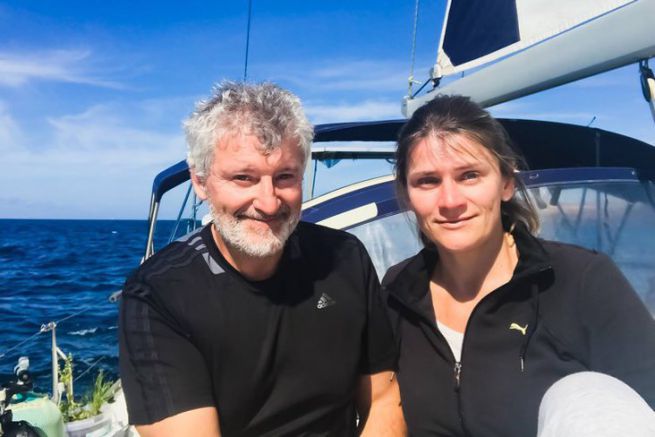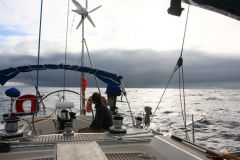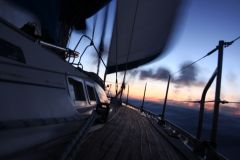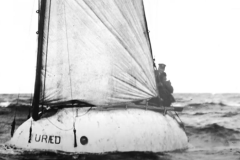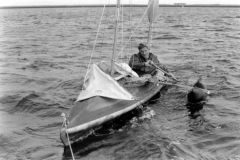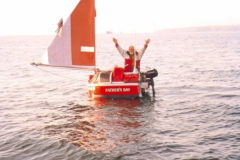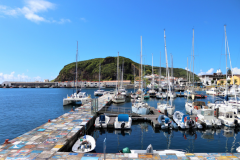The end of the year is approaching and with it the moment of the Atlantic crossing. A long navigation of two to four weeks awaits the crews and their sailboats. Everyone is preparing for it. For some, it will be the first transatlantic race, which is our case.
We, Dajana and Ivo, sail around the world as a couple aboard Silkap (an Océanis 440). A big difference compared to other long-distance sailors: we knew absolutely nothing about sailing until a while ago! And today before embarking on this transatlantic crossing, we wonder what the big crossing will look like and what could happen to us?
The apprehension of the unknown awaits us. To be together in the middle of the ocean, very far from any help, without access for a few weeks to a supermarket, the Internet, a shipchandler and a naval professional. We would like to know what really awaits us.
Meeting with a specialist in crossing safety
To advise us, we met Oliver Solanas Heinrichs, a navigator specialising in Atlantic crossing safety. Oliver is the founder of 8islas.com and co-author of The Cruising Guide to the Canary Islands. He is also the organizer of the Viking Explorers transatlantic rally, which is in its third edition in 2019.
While Oliver started sailing thanks to his father, his real sailing experience began seven years earlier in the Canary Islands. At that time, his sailboat became his home and navigation his full-time occupation. He has done the transatlantic race several times, in both directions, on very different types of boats.
In addition to Oliver's personal experience in his transatlantic races, there are lessons learned from other transatlantic rallies. First by working as a safety manager for the ARC (Atlantic Rally for Cruisers) and then by organizing the Viking Explorers Rally himself.
To make fewer mistakes during our transatlantic crossing, we asked Oliver to explain the frequent problems that sailors encounter during a crossing. If we first expected a list of hardware problems, it begins by describing points that we would not have thought of.
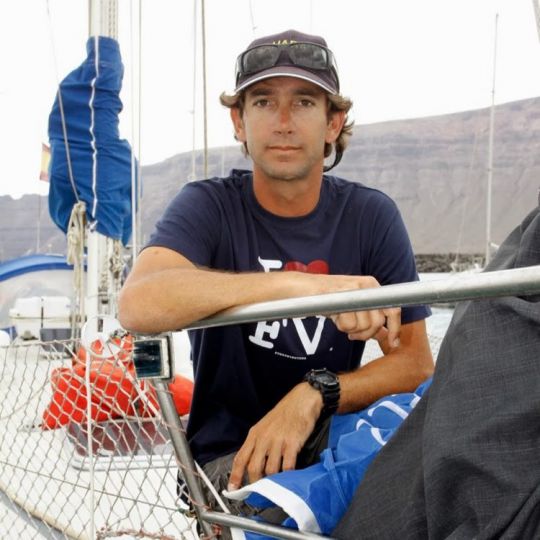
Waste management
The ocean is not a garbage can and the waste on board accumulates quickly. "You can throw into the sea anything that is organic and comes directly from nature," reminds us Oliver. "All other waste will be stored until arrival." As some of the food will come from the cans, it is important not to forget to rinse them with sea water before throwing them in the garbage.
The boarding of the crew in a deckchair is also synonymous with the boarding of stowaways: insects. And there are many of them. Cockroach eggs, for example, can be found on the packaging. The cardboard should be banned from the boat. Milk and juice cartons, preserves, fruits are to be washed before loading them. In any case, a gel-like insect repellent in a syringe should be on board to prevent the development of these insects.
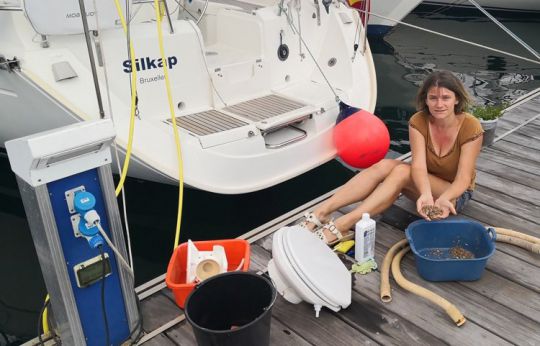
Attitude of the crew
Getting together on a boat for several weeks is a different scenario from a coastal navigation of a few hours. Thinking, "Here, I've had enough, I'm going home" is not an option. Everyone must support themselves in a confined space. Everyone has their moods and fears, tensions can arise. A crossing can also lead to the separation of a couple or break a long-standing friendship.
"The deckchair is not just about sailing. It's also psychology. It all depends on people's attitudes," Oliver admits. His best crossing was with a crew member who was just starting sailing. He also did a transatlantic race with 8 experienced skippers on board. "In this case, there is only one captain of the ship," he explains, "he alone makes the decisions."
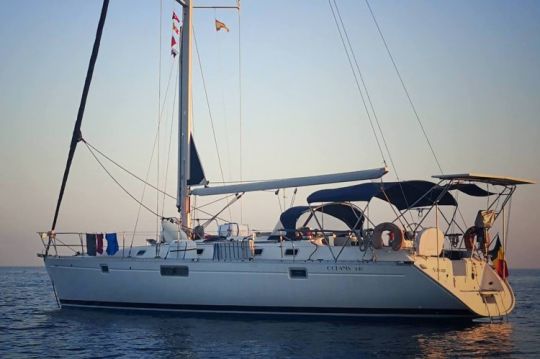
Electricity management
Sailing boats often have all the comforts of home: fridge, freezer, microwave, washing machine, water heater. In addition, there is the watermaker, the autopilot and all the electronics for navigation. These last two rotate permanently during a crossing. Oliver reminds us that the whole boat runs on electricity and that we need to know its production and consumption. Of course we can put the engine in to generate some, but then we will have to manage the capacity of the diesel fuel.
Oliver's sailboat is equipped according to the KISS concept. It is the abbreviation for "Keep it simple and stupid". He only has the bare minimum on board. Moreover, our boat follows almost the same concept, our budget is limited. Isn't the adventure of a world tour also knowing how to live without all the comforts of home?
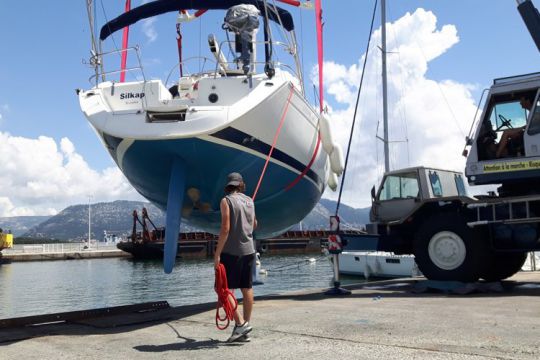
+ more equipment = more problems
Everything on the boat works in a chain according to Oliver. To have more comfort on board, more equipment is installed. Comfort is linked to safety and electricity management. We should not rely entirely on the equipment, as it can fail at any time. The more equipment on board, the more maintenance, problems and repairs are required. More spare parts will also have to be stored. In any case, it is important to plan B when equipment is missing.
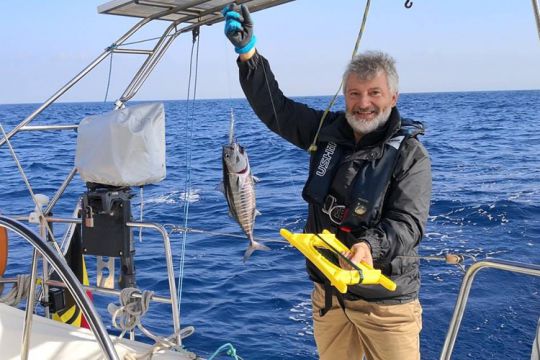
Material breakage
When crossing the Atlantic, the sailboat is under constant pressure. "It's nice to see the performance of your boat. But if we want to go fast, there will be some breakage," explains Oliver. It concerns the rigging, halyards or sails as well as the pilot or plumbing. Here is his advice: "don't push your boat and go around regularly, both on deck and inside, to check if everything is in order."
The deckchair is also the famous grain on the road. The wind can suddenly increase to 15 or 20 knots for 10 to 30 minutes. At night and without radar, you don't see these big black clouds. The poles often break because of the grain. Oliver's advice is very simple: anticipate and reduce the sails at night.
A boat for the crossing is being prepared. The same applies to the crew. Knowing your boat, knowing how to repair equipment, having a plan B, knowing what to do in case of an emergency, all this is part of it.
Crossing for fun
Let's not forget that our sailing round the world trip is a pleasure and not a regatta. The risks of a crossing are numerous. Slowing down considerably reduces problems. What is 1 or 2 more days on a 15 to 20 day trip? We will also remember Oliver's next sentence: "It is better to be a coward and arrive safely than to be brave and end up in the cemetery."
